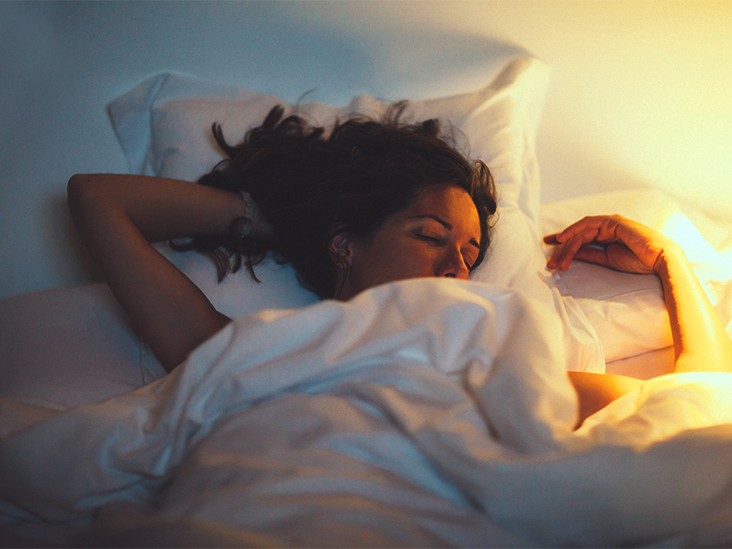Oversleeping Is Actually A Thing: The Effects & Serious Health Risks of Sleeping Too Much!

We often hear about the real dangers of getting too little sleep, but on the other end of the spectrum, sleeping too much also appears to have some risks.
It’s known that sleep is a time when the body repairs and restores itself, and getting too little rest can lead to a whole host of health problems.
So, more sleep must be better right? Not so fast, say some researchers.
More evidence is showing that spending an excessive amount of time in bed is also linked with health hazards. In some ways, oversleeping itself appears to directly influence certain risk factors, and in other cases, it may be a symptom of other medical conditions.
Are You Sleeping Too Much?
First, let’s address what oversleeping means. The gold standard of normal has long been considered eight hours, and it’s a good median benchmark. Recent reviews of current research from the experts at the National Sleep Foundation broaden the spectrum a little. They say that somewhere in the range of seven to nine hours is normal and healthy for most adults between 18 and 64 years of age.
The “right” amount of sleep proves somewhat individual as some people will feel great on seven hours and others may need a little longer. However, in most studies and for most experts, over nine hours is considered an excessive or long amount of sleep for adults.
If you sleep in a little sometimes on the weekends, it’s likely no big deal. If you regularly sleep more than nine hours each night or don’t feel well-rested on less than that, then it may be worth taking a closer look.
“If someone is sleeping too much, more than 9 hours each night, the quality of sleep should be evaluated. If the quality of your sleep is poor, it could result in more time in bed. Your body needs deep restorative sleep, and if that is not happening during the recommended 8 hours, your body will instinctively try to prolong the sleep period to obtain the quality of sleep it needs,” says Michele Roberge. Michele currently leads a hospital-based sleep disorder center where she specializes in treating patients with sleep apnea.
She adds, “Look at what could be causing the poor sleep quality—environmental factors (lights, noises, an uncomfortable bed, etc.), medications, comorbid conditions (depression, chronic pain, etc.), or sleep disorders (sleep apnea, narcolepsy, bruxism, PLMD, etc.).”
The Health Impact of Oversleeping
Seeking to find the sleep “sweet spot” for optimal health, researchers have been busy recently looking at how different habits connect with physical and mental well-being. Several trends have emerged linking oversleeping with higher rates of mortality and disease as well as things like depression.
Research Links Longer Sleep Habits with:
- Cognitive impairment
- Depression
- Increased inflammation
- Increased pain
- Impaired fertility
- Higher risk of obesity
- Higher risk of diabetes
- Higher risk of heart disease
- Higher risk of stroke
- Higher all-cause mortality
- Impaired Brain Functioning and Mental Health
Cognition
Using data from the Lumosity brain-training platform, researchers found that cognitive performance on three different games all peaked when people slept around seven hours, worsening with more or less rest. Other studies have also found memory impairments and decreased cognitive function with longer sleep.
Degenerative Diseases
Other research indicates that getting too little or too much sleep may be tied to increased Alzheimer’s disease risk factors and a large Spanish study found that long sleepers may be at increased risk of developing dementia.
Depression and Mental Health
Oversleeping is considered a potential symptom of depression. While many people with depression report insomnia, about 15% tend to oversleep.
People with long sleep durations are also more likely to have persistent depression or anxiety symptoms compared to normal sleepers. A recent twin study also found that sleeping too little or too much seemed to increase the genetic heritability of depressive symptoms compared to normal sleepers.
Increased Inflammation Factors
Chronic inflammation in the body is tied with an increased risk of everything from diabetes to heart disease to Alzheimer’s disease. Certain lifestyle factors like smoking, being obese, and prolonged infections can contribute to inflammation, and getting too little or too much sleep may also play a role.
Increased Pain
While many times it can seem intuitive to rest more when we’re in pain, research shows that in some cases too much sleep can exacerbate symptoms.
Back pain can worsen from too little activity or spending too much time in bed. Sleeping in an un-ergonomic position or using an old or unsupportive mattress can also worsen back pain. Combined with staying still for a long period of time, these factors mean many people awake with worse back pain especially when spending longer amounts of time in bed.
Oversleeping is also linked with higher rates of headaches. Referred to as a “weekend headache,” sleeping in may trigger migraines and tension headaches. The cause isn’t necessarily sleep itself, though, as some researchers link it with caffeine withdrawal or increased stress.
Higher Heart Disease Risk
Using information from the large National Health and Nutrition Examination Survey (NAHNES), researchers linked both short and long sleep with a higher risk of coronary heart disease and stroke. The study found that people sleeping more than eight hours per night were twice as likely to have angina (chest pain caused by reduced blood flow) and 10% more likely to have coronary heart disease.
Higher Stroke Risk
A recent study from the University of Cambridge researchers looked at data from around 9700 Europeans over a period of 11 years. People who slept over eight hours were 46% more likely to have had a stroke during the study period after adjusting for comorbid factors. People whose sleep duration had increased during the study had a four times higher risk of stroke than consistent sleepers, suggesting that longer sleep could be an important symptom or warning sign of stroke risk.
Data from older NHANES surveys also found a significant relationship was found between long sleep and stroke risk. People who slept more than eight hours had a 50% higher risk of stroke than people who slept six to eight hours. People who slept over eight hours and who also had daytime drowsiness had a 90% higher stroke risk compared to normal sleepers.
Preventing oversleeping:
- Get enough sleep, seven to nine hours a night.
- Do not oversleep on weekends this throws your circadian rhythms off and makes falling asleep even more difficult when the work week comes along.
- Expose yourself to bright sunlight upon awakening. Consider leaving the drapes or blinds open at night. That morning sunlight will help you to wake up.
- Consider getting a dawn sunlight emitting alarm clock. Many of my patients are using them.
- You can set the dawn light to start filling your room with light 15 to 30 minutes before the alarm goes off.
- Avoid excessive naps especially after 4 PM. These may make it more difficult to fall asleep and result in oversleeping. The same goes for excessive caffeine and blue light exposure close to bedtime.
- There are myriad reasons to avoid oversleeping from loss of your job to missing out on mornings with your family. However, if you continue to have this problem and struggle to wake up make sure there is not an underlying sleep disorder at fault.
Sleeping Well: The Most Important Things You Can Do
Eat Healthily
Research links eating a balanced diet with a wide variety of nutrients and adequate calories, carbohydrates and fats with normal sleep durations. In one large study of diet and lifestyle habits using NHANES data, long sleepers tended to eat less variety of foods and fewer carbohydrates and calories overall. Their diets were also lower than normal sleepers’ on a few nutrients:
- Theobromine – found in chocolate and to a lesser extent in guarana.
- Dodecanoic acid – found in coconuts, coconut oil, and palm kernel oil.
- Choline – found in shrimp, fish, eggs, turkey, soy and some dark leafy greens.
- Selenium – found in brazil nuts, fish, shrimp, turkey, chicken, beef and some whole grains.
- Lycopene – found in guava, watermelon, cooked tomatoes, red cabbage, and red peppers.
- Phosphorus – found in pumpkin seeds, sunflower seeds, eggs, fish, brazil nuts, lean meats, tofu, and lentils.
- Try to include a diverse range of fruits, vegetables, lean proteins, nuts, and grains so your body receives the minerals, vitamins, and nutrients it needs to function.
Things like watermelon, tomatoes, carrots, leafy greens, walnuts, almonds, chicken, wild salmon, and whole grains like oats, wheat, millet and amaranth all supply sleep-supporting nutrients. Pure water intake is also important — people who had better sleep drank plenty of plain water throughout the day.
But, don’t eat too much too close to bedtime, as heavy, fatty or spicy midnight snacks could backfire and keep you up or affect sleep quality.
Avoid Alcohol Completely
Research has found that consuming alcohol within a few hours of bedtime makes sleep more fragmented and less restorative.
Alcohol changes sleep cycles, impacting both slow-wave and REM sleep as well as various hormones and neurotransmitters. The overall effect of less restorative rest possibly creates the desire to sleep longer hours (and also reduces overall activity, further affecting health).
Get Exercise
Engaging in regular activity and moderate exercise helps promote higher quality sleep and healthy sleep duration. While studies on exercise and sleep largely focus on reducing insomnia, it can help long sleepers, too. Getting higher quality of sleep and waking less during the night can help you feel more rested and energized during the day.
Get Consistent Sunlight
Our bodies’ circadian clocks guide the release of hormones and neurotransmitters that tell us when to be awake and when to sleep. It takes its cues from things like behavior patterns, temperature, environment, and particularly, light.
Exposing yourself to direct sunlight early in the morning supports circadian rhythms (and Vitamin D production, which may play a role in sleep hormone melatonin). Sip your morning coffee outside, take an early walk, or park further from your office to catch some rays. Working near a well-lit window can also be helpful. If you have a difficult schedule or live in a climate where getting morning sunlight isn’t possible, light therapy may be beneficial.
Stick to a Regular Bedtime and Wake Time
Another important way to support your body’s internal clock is to make your bedtime and wake time more consistent. As explained by Dr. Rosenburg above, irregular hours can throw off rest, making it harder to fall asleep on nights after sleeping in and leading you to be tired the next day.
When bedtimes and wake times are regular, your body’s systems learn when it’s time to initiate drowsiness and when it’s time to be awake.
Set Your Bedroom Up For Success
Pay close attention to your sleep space to make sure lights, sounds and temperatures are optimal for rest.
Calm noises. Disruptive sounds can make it hard to fall asleep and can affect sleep during the night. If you prefer complete quiet, earplugs or noise-canceling headphones can help. If you prefer background noise, try sound conditioner/white noise machines or apps that play white and nature sounds
Comfort. Your mattress can play a role in sleep, especially when it comes to pain and tossing and turning. Age is important — the average bed is meant to last around eight years, so if your’s is older, it may be lacking support and comfort.
Temperature. Cooler temperatures support better sleep. Set your thermostat in the 62 to 70 range, and opt for breathable sheets, blankets, and pajamas. Materials like cotton and wool help support a balanced body temperature and keep you comfortable throughout the night.



